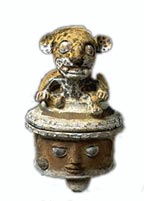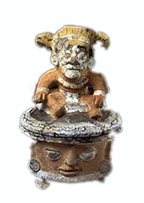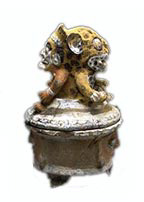


In the movie The Golden Compass (movie adaptation of the
first book in British author Philip Pullman’s trilogy), people are accompanied
by a “daemon,” a sort of double of their conscience in animal form.
In Greek mythology, the word meant any entity existing in an intermediary plane
between the gods and human beings.
According to Plato, Socrates said that he had a little daïmon that was gifted
with wisdom and that did not hesitate to advise him.
In Native North American cultures, the physical world is not the only plane of
reality. There are others, all more subtle than the physical world, all
interwoven with each other and all inhabited.
In these cultures, some human beings are recognized as being able to move and
act in this multi-dimensional network, for the good of the human community. They
are generally portrayed with a “double” in the form of an animal.
Philip Pullman states that he never uses the words “spirit,” “spirituality” or
“spiritual” because they have no meaning for him and that, when he comes into
contact with the word “spirituality,” his reaction is one of immediate
scepticism.
In Pullman’s vision of the world, daemons are definitely not the daïmons of
Greek mythology or Orphic, Platonic or Neo-Platonic philosophy, nor are they the
forms described in Middle Eastern or Christian angelology, the totemic animals
of the Native North Americans or the shaman doubles found in pre-Columbian
cultures.
However, through his work, Pullman has undoubtedly awakened a desire to know
more about these strange daïmons, spirit guides, totemic animals, angels and
demons, present in all mythologies and in the traditions of the world that see
reality as a “body-soul-spirit” complex.